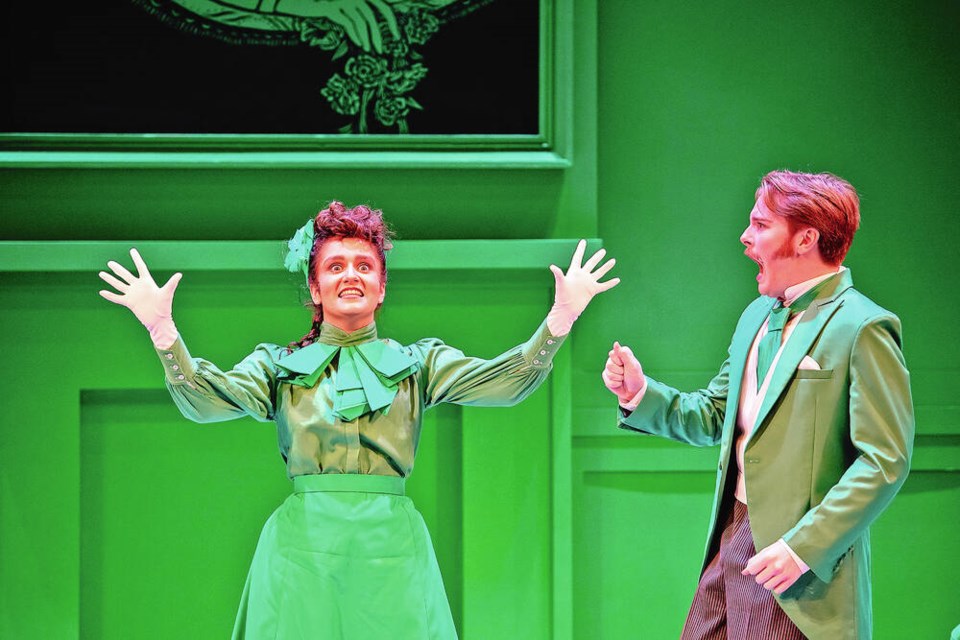The bold design (Bright crimson! Neon green! Canary yellow!) of the University of Victoria’s The Importance of Being Earnest may jolt audiences into a re-examination Oscar Wilde’s 19th-century masterpiece.
In a new student production at the Phoenix Theatre, each act is dominated by a different colour. It’s a simple idea, yet the effect is curiously potent. These strong colours shake us up a little and perhaps encourage audiences to view a familiar classic with fresh eyes.
The Importance of Being Earnest is a rollicking satire skewering the stodginess of Victorian society. We’re presented with a continuous stream of brilliant epigrams — it’s thrilling to experience Wilde’s spectacular wordplay.
Director Alistair Newton encourages us to dig a little deeper. In this comedy of manners, Wilde subversively riffs on an underground world — a world in which queer people were compelled to live double lives. While a few sophisticates might have picked up on this, it’s something that wouldn’t be noticed by most audience members of the time.
The playwright experienced his own difficulties in this regard. Wilde’s same-sex relationship with Lord Alfred (Bosie) Douglas was exposed when Wilde was tried for “gross indecency” and sent to jail with hard labour. The scandal led to the premature closing of The Importance of Being Earnest, despite its popularity.
To draw attention to the play’s queer subtext, Newton introduces two new characters. Lady Stella Clinton and Vesta Tilley are based on real-life drag artists from the period.
The show opens with Stella (Eric Barnes) singing Gilbert and Sullivan’s The Aesthete in a ball gown. Act III is introduced with Vesta (an appealingly sly turn by Claudia Frasier in a tux and top hat) crooning the music hall number I’m Following in Father’s Footsteps. The evening finishes with the full cast singing another music hall favourite, The Boy I Love is Up in the Gallery.
Purists may raise eyebrows over such tinkering, but it does work. It’s successful partly because the new characters of Lady Stella Clinton and Vesta Tilley appear outside the action, rather than being arbitrarily shoehorned in.
Equally daring is the production’s use of colour. Each section of the play has its own hue — Act I is green, Act II is yellow, Act III is red. And it’s not just the backdrops — costumes, tables, chairs and bookcases all look like they’ve been dipped in paint. When Algernon sips a glass of sherry, the liquid is chartreuse (rather than burgundy) to fit in with the green theme.
To fully understand the significance of this, one must read the program. Newton says Wilde and his pals used to dye their lapel flowers green. The yellow is inspired by covers of racy French books, while the red is the same colour Wilde chose for his home office.
The casual observer won’t pick up on these historical references — and Newton likely doesn’t intend us to. It doesn’t matter much; these stylish sets (by designer Zoe Bechtold) work without reading the footnotes. The use of non-naturalistic colour and the addition of cross-dressing characters jar the audience out of complacency and help attune us to Wilde’s allusions to a queer underworld.
The plot hinges on the dual lives of friends Algernon and Jack. In order to shrug off the constraints of upper-class English society, they invent alter egos and imaginary friends. Jack assumes the guise of a wastrel called Ernest when he’s in the city. Algernon visits Bunbury, a pretend friend in the country, to escape his own tedious social obligations.
Critics have said the twin identities of Wilde’s characters reflect the dual lives of queer people in Victorian times. The play is said to be replete with gay references. For example, “Bunburying” may refer to illicit sexual activity. “Ernest” may have been a code word for someone embracing a queer lifestyle.
The show has a buoyant sense of style and panache. Thursday’s performance benefited from lively pacing. An emphasis on movement and gesture helps leaven the denseness of the dialogue.
Jack Storwick (Algernon) and Carter Lapham (Jack) delivered standout performances. Each moved well and projected/enunciated wonderfully. Also notable was Samantha Frew in a confident comic turn as Cecily. On this particular night Annalyn Kind’s Lady Bracknell exaggerated the grand-old-dame character to the point of caricature — something that could be easily remedied.
Additions to the play result in a longer production of 2 1/2 hours — but it’s well worth it. The Importance of Being Earnest continues at the Phoenix Theatre to Nov. 25.



